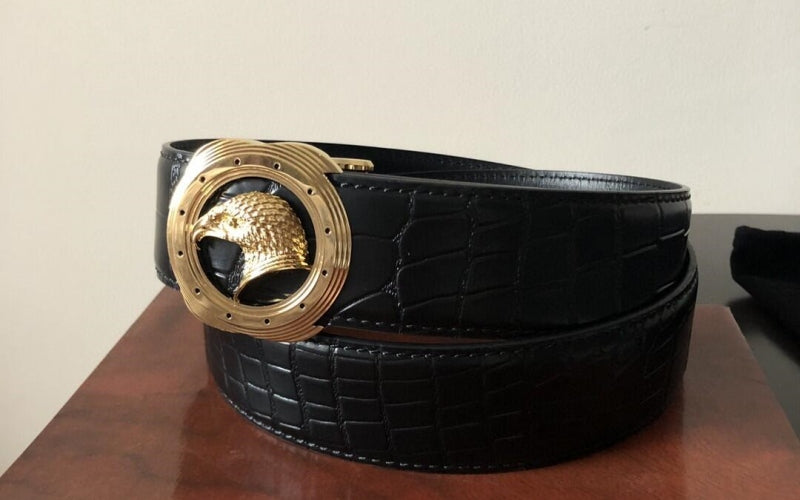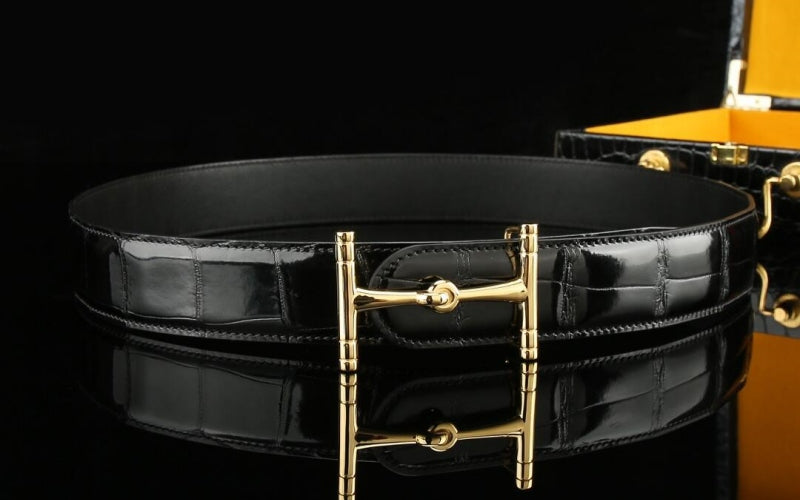
Are Alligator Watch Straps Legal? ( It’s a Jungle Out There)
So, you’re eyeing that sleek alligator watch strap—the one that makes your Apple Watch look like it belongs on James Bond’s wrist. But hold up. Before you swipe that credit card, you’re hit with a nagging thought: “Wait… is this even legal?”
Good question. The world of exotic leather is murkier than a Louisiana swamp at midnight. Between international treaties, ethical minefields, and laws that change faster than TikTok trends, buying an alligator strap can feel like navigating a legal obstacle course.
As someone who’s gotten side-eyed by customs agents (thanks, questionable eBay purchases) and interviewed reptile farmers who’d rather wrestle gators than paperwork, I’m here to break it all down.

1. The Short Answer: Yes, But…
Here’s the deal: Alligator watch straps are legal if they meet three criteria:
-
The gator was farmed, not wild-caught.
-
The product has CITES certification (more on that later).
-
You’re not in California, New York, or Hawaii (we’ll get to that).
But let’s be real—nobody wants the CliffsNotes. You’re here for the drama, the loopholes, and the “Wait, that’s a thing?!” moments. Let’s dive in.

2. The CITES Treaty: The Passport for Exotic Leather
What is CITES?
The Convention on International Trade in Endangered Species is like the UN’s bouncer for wildlife. Created in 1975, it decides which animals can be traded globally. American alligators were nearly extinct in the 1960s but bounced back thanks to conservation. Today, they’re listed under CITES Appendix II, meaning trade is allowed but tightly controlled.
How It Works:
-
Farms must prove their gators are bred in captivity, not snatched from swamps.
-
Every hide gets a CITES tag with a unique number. No tag? No sale.
-
Countries can add extra rules. For example, the EU requires an import permit.
Fun Fact: CITES paperwork is so tedious, some tanners hire full-time staff just to handle it. Imagine explaining that job at a family reunion.

3. The California (and Friends) Problem
Why Three States Hate Your Gator Strap:
-
California: The California Endangered Species Act bans all croc/gator products, even CITES-certified ones. Why? Blame the 1970s, when activists lumped alligators with actually endangered species.
-
New York: NYC banned exotic leather sales in 2022. You can still wear your strap, but selling it? Fuhgeddaboudit.
-
Hawaii: Their invasive species laws are so strict, you’ll get fined for bringing in a pinecone. An alligator strap? Straight to jail.
Loophole Alert: If you already own the strap before moving to these states, you’re safe. So, uh… keep your receipts.

4. How to Spot Legal vs. Illegal Straps
Legal:
-
CITES Tag: A small, tamper-proof label stitched into the strap. Check for a unique ID number.
-
Seller Transparency: Reputable brands like Hermès or Montblanc provide CITES docs. If they dodge questions, run.
-
Made in the USA: American farms follow strict rules. Straps from China? Riskier than a gas station sushi roll.
Illegal:
-
“Wild-Caught” Claims: If the seller brags about “authentic swamp gator,” they’re either lying or felons.
-
No Paperwork: “Trust me, bro” isn’t a CITES permit.
-
Too Cheap: CITES-certified gator costs $200–$500. A $50 strap is as fake as a Kardashian’s humility.
Pro Tip: Snap a photo of the CITES tag and Google the number. If it pulls up a Russian spam site, you’ve been had.

5. The Ethical Elephant (or Alligator) in the Room
The Farming Debate:
-
Pro-Farming Argument: Alligator farms protect wild populations. Louisiana’s wild gators went from near extinction to 2+ million today, partly because farming made them valuable alive.
-
Anti-Farming Argument: Groups like PETA argue farming is cruel. Gators are solitary in the wild but packed into pens on farms.
Middle Ground: Look for Certified Humane farms or buy vintage. Yes, vintage gator is a thing—check eBay listings from the 90s.

6. Airlines & Travel: Can You Fly With Gator?
Domestic Flights:
-
Legal States: Pack your strap in checked luggage. No one cares.
-
California: Technically illegal, but TSA won’t check unless you’re smuggling 50 straps in your socks.
International Flights:
-
To the EU: Bring your CITES docs. Customs agents will ask.
-
To Australia: They’re stricter than a nun with a ruler. Declare it or face a $10k fine.
Nightmare Fuel: In 2019, a British tourist was jailed in Egypt for having a croc belt without papers. Don’t be that guy.

7. What Happens If You Get Caught?
In the USA:
-
First Offense: Fine up to $10,000.
-
Repeat Offense: Jail time (up to 1 year) and a felony record.
In the EU:
-
Fines: Up to €50,000 and confiscation.
In California:
-
Penalties: They’ll treat you like you smuggled uranium. Expect fines, community service, and eternal shame.

8. 2025 Trends: Lab-Grown Gator & Vegan Alternatives
The Future Is Weird:
-
Lab-Grown Leather: Startups like VitroLabs are 3D-printing gator skin from cells. It’s legal, ethical, and costs… well, your firstborn.
-
Vegan Gator: Brands like Cactus Leather Co. make straps from cactus or pineapple fibers. Downside: They feel like a reptile’s vegan cousin.
9. The Gray Market: eBay, Etsy, and Back-Alley Deals
Risky Business:
-
eBay Listings: 60% of “vintage” gator straps lack CITES tags. Sellers use phrases like “rare, no docs” to dodge liability.
-
Etsy “Artisans”: Many use illegal hides from Asia. Reverse image search their pics—if they’re on Alibaba, it’s a scam.
-
Pawn Shops: Some knowingly sell poached goods. Ask for CITES tags or walk.
Red Flag: A seller who says, “CITES is a government conspiracy.” Sure, Karen.
10. How to Legally Sell Your Gator Strap
Step 1: Keep all original CITES docs and receipts.
Step 2: List it as “CITES-certified vintage” on platforms like The RealReal.
Step 3: Avoid California and New York buyers (seriously).
Tax Trick: Donate it to a museum for a write-off. Yes, even your watch strap can be a tax deduction.
11. Celebrities & Gator Straps: A Love-Hate Saga
-
Leonardo DiCaprio: Wears CITES-certified gator straps… and lectures about climate change. The cognitive dissonance is strong.
-
Beyoncé: Rocked a vintage gator strap in her 2023 tour. PETA stayed suspiciously quiet.
-
Elon Musk: Claims his strap is “lab-grown.” We’re 90% sure he’s lying.
12. The Verdict: Should You Buy One?
Yes If:
-
You live in anywhere but CA, NY, or HI.
-
You’ve budgeted for CITES-certified luxury.
-
You’re okay with ethical gray zones.
No If:
-
You’re a vegan activist (obviously).
-
You travel constantly and hate paperwork.
-
You think “sustainable luxury” means hemp sandals.

